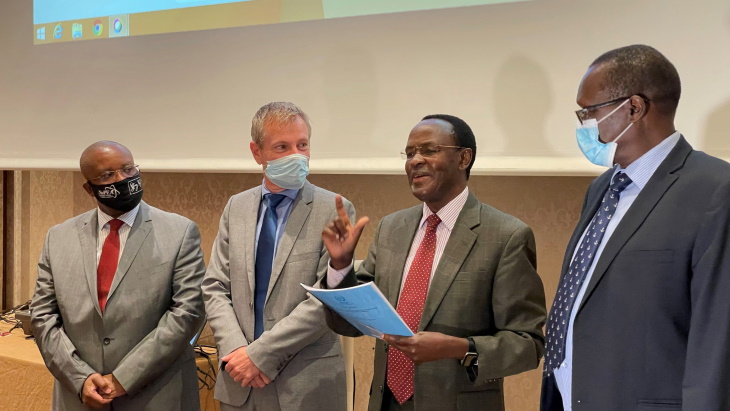Kenya makes nuclear infrastructure progress
The International Atomic Energy Agency has provided an update on Kenya's progress since its 2015 Integrated Nuclear Infrastructure Review (INIR) mission. INIR missions enable IAEA member states to have in-depth discussions with international experts about the conditions and best international practices in the development of a nuclear power programme.

Collins Juma, CEO, NuPEA; Eric Mathet, INIR team leader; Zachary Ayieko, Chief Administrative Secretary, Ministry of Energy; Ezra Odondi Odhiambo, Chairman, NuPEA (from left to right) during the closing session of the INIR follow up mission to Kenya (Image: T Reysset/IAEA)
Kenya - which has Africa's seventh-largest economy and a population of 52 million people - is considering the introduction of nuclear power to help meet its growing energy demand.
The 2015 INIR mission to Kenya made 15 recommendations and eight suggestions. Areas for further action included establishing the key goals and requirements to guide the nuclear power programme, and setting up the necessary legal and regulatory framework.
A follow-up INIR mission on 8-11 June assessed Kenya's progress and had a hybrid format, with two IAEA experts travelling to Kenya and two international experts from Ireland and Spain participating virtually.
The follow-up INIR team said that Kenya had completed 10 of the recommendations and four of the suggestions from the 2015 review. Progress included: development of the National Nuclear Policy and the National Policy and Strategy for Safety to enable the government to make an informed decision on whether to introduce nuclear power; enactment of a national nuclear law and establishment of a regulatory body with clear responsibilities for safety, security and safeguards; completion of an assessment of the national legal framework and identification of other laws needing review; and enhanced coordination among key stakeholders in the development of a nuclear power programme.
"Kenya made considerable efforts to address all the recommendations and suggestions made by the INIR team in 2015," said team leader Eric Mathet, operational lead of the IAEA's Nuclear Infrastructure Development Section. "The preparatory work needed to inform the government's decision has progressed."
"The follow-up INIR Mission has given a big impetus to the nuclear power programme for the country and therefore sets in place a new phase in the Milestone Approach," said Collins Juma, CEO and National Liaison Officer of the Kenya Nuclear Power and Energy Agency (NuPEA). "The next steps call for greater efforts by all stakeholders in ensuring that Kenya becomes a knowledgeable customer and is ready to invite bids for the first nuclear power plant."
The Kenyan Ministry of Energy proposed the potential use of nuclear energy for power generation and in 2019 the Kenya Nuclear Electricity Board transitioned to the NuPEA to undertake preparations for the development of a nuclear power programme.
Researched and written by World Nuclear News
- China Institute of Atomic Energy
- Nuclear Power Institute of China
- Southwestern Institute of Physics
- China Nuclear Power Operation Technology Corporation, Ltd.
- China Nuclear Power Engineering Co., Ltd.
- China Institute for Radiation Protection
- Beijing Research Institute of Uranium Geology (BRIUG)
- China Institute of Nuclear Industry Strategy (CINIS)
- China Nuclear Mining Science and Technology Corporation


